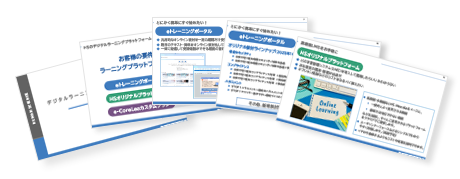2022.01.24
Rapid Expansion of Moodle Usage Due to COVID-19! Latest Status of Classes and Training Using LMS
It has been almost two years since the outbreak of the novel coronavirus caused significant changes around the world. Education and human resource development are no exception, as school classes and corporate training sessions have been forced to take place online.
Here, we will introduce the social situation where the onlineization of education and human resource development is progressing, changes in inquiries to our company, and case studies during the COVID-19 pandemic.

Table of Contents
1. Expansion of Online Education during the COVID-19 Pandemic
2. Changes in Customers during the COVID-19 Pandemic
3. Case Studies of Switching to Training Using Moolde
4. Initiatives Needed for Implementing Online Classes and Online Training in the Future
5. Introduction of e-Learning Implementation Support Services
1. Expansion of Online Education during the COVID-19 Pandemic
We will introduce the social situation where education is being transitioned online due to the COVID-19 pandemic.
This is the survey result by the Ministry of Education, Culture, Sports, Science and Technology.
In the second half of the 2020 fiscal year, 60% of students responded that their online classes were mostly or entirely online. (Survey conducted by the Ministry of Education, Culture, Sports, Science and Technology in March 2021 on the impact of COVID-19 on student life)
The situation where online classes were forced due to the pandemic and the advantages and disadvantages felt by students have been clarified.
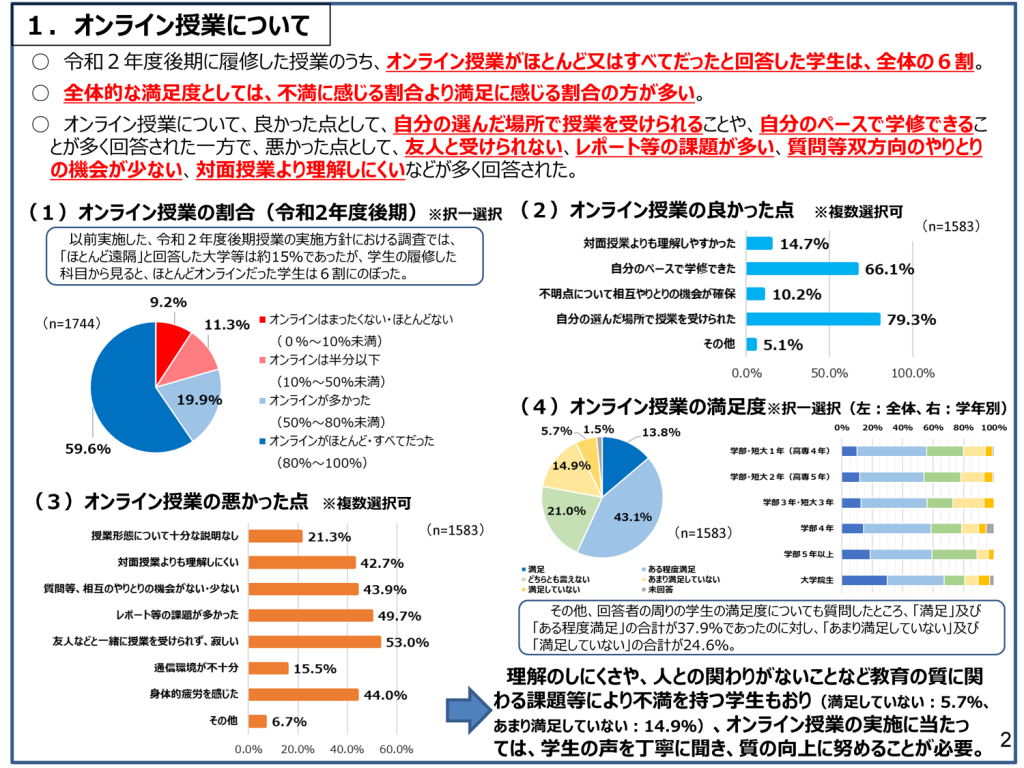
In March 2021, the Ministry of Education, Culture, Sports, Science and Technology announced the "Plan for the Advancement of University and Technical College Education Utilizing Digital Technology" as part of its measures against the COVID-19 pandemic.
This initiative aims to actively incorporate digital technology in universities and technical colleges, creating an environment that realizes learner-centered education and improves the quality of learning, with a budget of 6 billion yen.
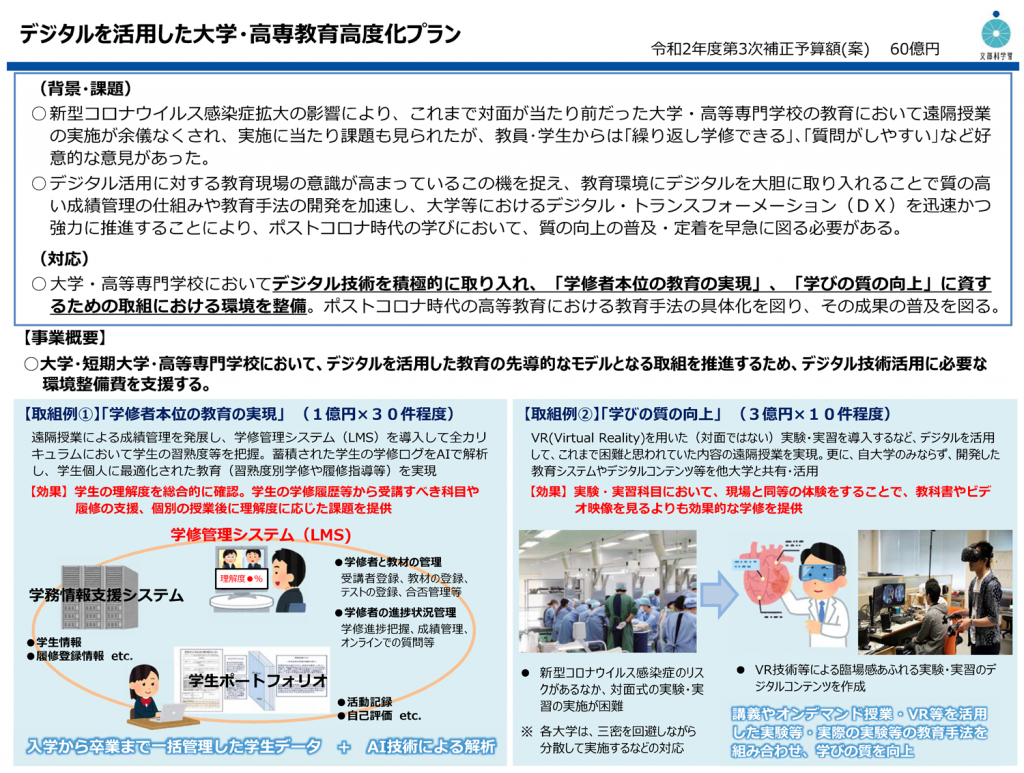
In this project, we have already received many applications from educational institutions, and the adoption of the plans has been completed. For the plans adopted in this project, please see the link.
(https://www.mext.go.jp/a_menu/koutou/sankangaku/1413155_00010.htm)
In corporate training, the shift to online formats is also progressing.
According to a survey by Persol Research Institute, 75.0% of companies increased their online group training in 2020. (Survey period: January 29, 2021 - February 10, 2021. Source: https://rc.persol-group.co.jp/news/202107051000.html)
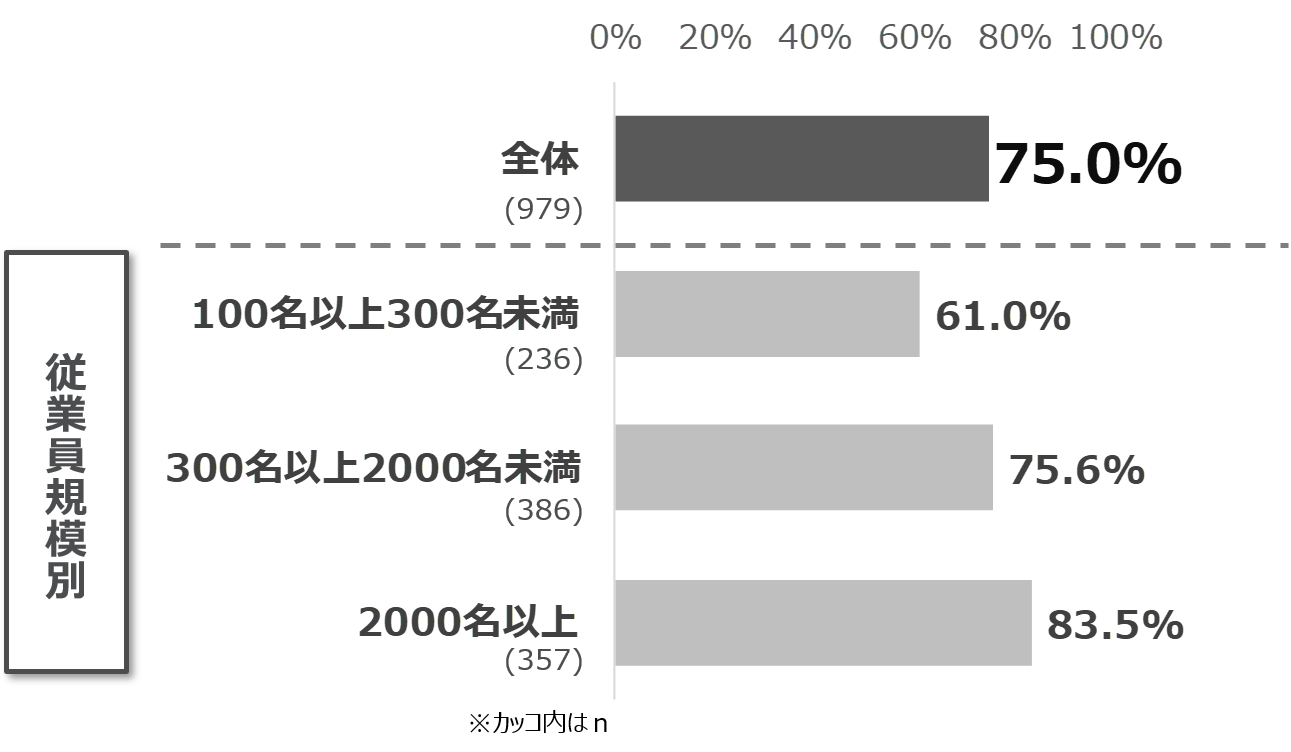
Training for national qualifications is also being advanced online.
This is a table showing the number of national qualifications for which training is required during updates, and it is stated that "training does not have to be conducted in person." (Ministry of Internal Affairs and Communications Administrative Evaluation Bureau Report (Rei 2.12.16) "Survey on the Review of Training and Workshops Associated with the Renewal of National Qualifications"
https://www.soumu.go.jp/main_content/000723456.pdf (as of August 22, 2021)
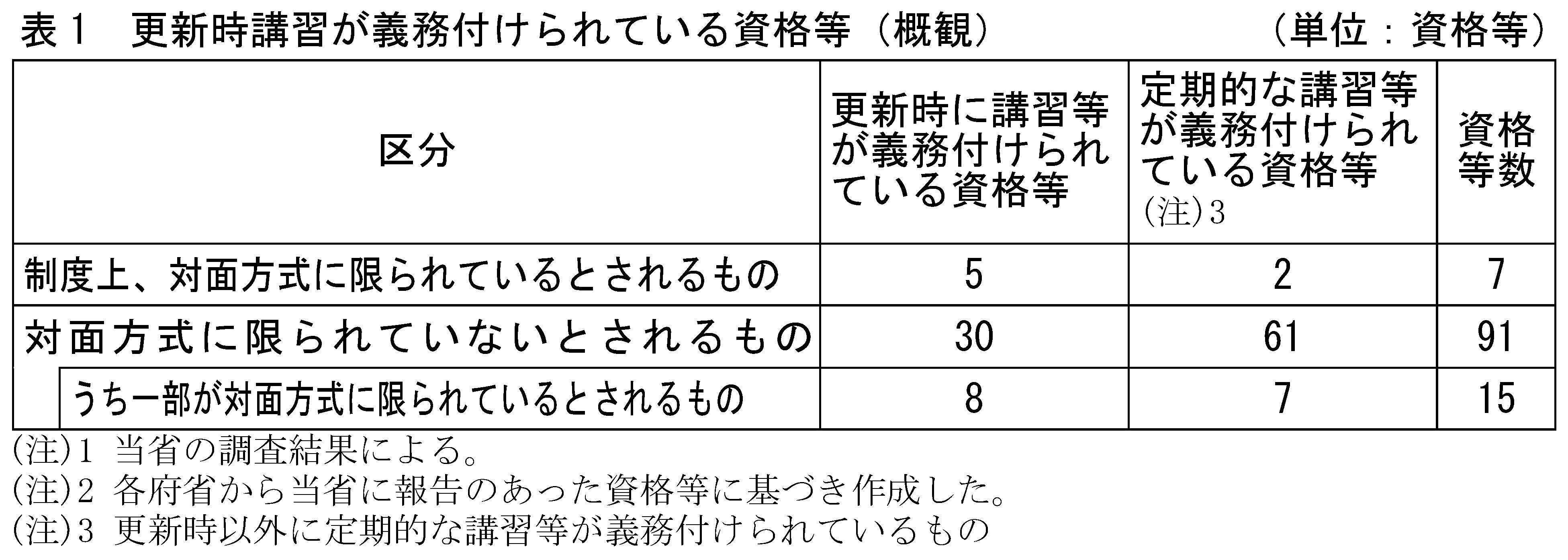
More than 60% of the 98 national qualifications that require training upon renewal can be obtained without face-to-face instruction.
This suggests that there is a high possibility of promoting the online delivery of private qualification courses.
2. Changes in Customer During the COVID-19 Pandemic
Now, we will explain the case studies of our clients.
First, what was the situation regarding the use of e-learning before the COVID-19 pandemic?
Here is an example from a university interview.
Case Study of a National University (6,000 Students)
This university has been using Moodle on campus since before 2015.
In December 2016 and January 2020, we would like to introduce the content of the interviews conducted with the person in charge of the Information Infrastructure Center department, which is responsible for e-learning. In both instances, we inquired about the usage status of Moodle, and after about three years, there has been no significant change in the usage rate, making it difficult for e-learning to progress.
*Moodle is an open-source LMS that provides e-learning delivery within the university.
*LMS (Learning Management System) is a system used to conduct online classes and training, distributing videos and materials, and managing attendance.
- December 2016 Hearing
Deputy Director of the Information Infrastructure Center: "We hold an explanatory meeting for teachers about once a year. Moodle is available for all faculty and staff."
Professor of the Information Infrastructure Center: "According to statistics, there is a barrier of 10-15% usage rate of the system. Once that is exceeded, usage increases rapidly. At our university, initially, the use of Moodle was limited, but at a certain point, usage suddenly increased."
- January 2020 Hearing
Human Science: Is usage expanding?
Information Infrastructure Center Professor: "About 20% of the faculty are using it. The number of teachers using it interactively is even more limited. Most are using it for uploading teaching materials."
You can find case studies of implementation in schools in this article.
> Moodle Basic Course: What can the e-learning management system Moodle do?
> 4 Key Points for Comparing e-Learning and LMS (Learning Management Systems)
Increase in Moodle Inquiries
However, as you know, the situation changed drastically due to the COVID-19 pandemic.
Since April 2020, we have seen an increase in inquiries from new clients considering the use of the open-source LMS, Moodle. Here is the trend of inquiries we have received from new clients regarding e-learning systems.
Trends in Inquiries to Our Company
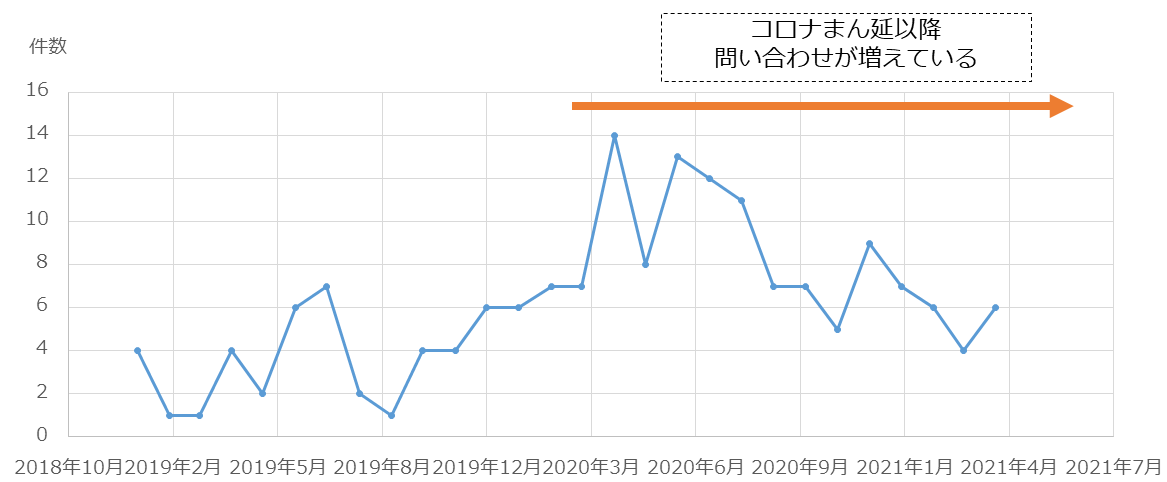
Since the spread of COVID-19, the number of inquiries has increased.
Also, here is the percentage of business types of the customers who have made inquiries.
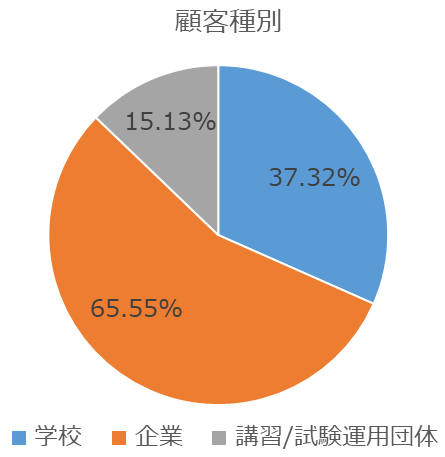
The majority were companies, with nearly 40% of inquiries coming from schools.
> Moodle is not only used by universities (widespread use)
3. Case Study on Switching to Training Using Moolde
From here, we will introduce actual case studies.
Case Study of a General Incorporated Foundation Related to Energy Development
Our corporation has been inviting representatives from overseas companies every year to conduct training on energy development. The training was approximately two weeks long and involved around 600 participants from about 30 countries.
However, due to the COVID-19 pandemic, it became difficult for students to come to Japan.
Therefore, we switched to live lectures using LMS (Moodle). The materials have been changed to be distributed online.

Case Study of a Dental Qualification Organization
This organization provides information dissemination and certification in specific fields of dentistry. There are approximately 4,000 dental professionals registered with the organization.
Regarding certification, we have conducted exams annually for dentists wishing to become certified. The certification exam includes a presentation, during which 40 to 50 dentists and several examiners gather at the venue.
However, due to the COVID-19 pandemic, gathering at the venue has become difficult.
Therefore, we switched to an exam format utilizing an LMS.
(Changes during the COVID-19 pandemic)
Difficulty in gathering at the venue → Switch to using LMS (Moodle)
The exam process is as follows:
Submission of application form
Presentation and evaluation via Zoom (starting from LMS (Moodle) to Zoom)
Oral examination via Zoom (examiners ask questions about the presentation, and the candidate responds)
4. Initiatives Required for Conducting Online Classes and Online Training in the Future
It is said that the end of the COVID-19 pandemic is still some time away. Moving forward, online classes and online training will continue to be challenges for educational institutions and those in charge of human resource development. Here, we will explain the challenges of continuing online classes and online training, as well as the countermeasures.
Issue 1: Response to Multiple Access
As usage expands and access becomes concentrated, the likelihood of delays and system outages increases.
To prepare for such situations, we must enhance the infrastructure environment. It is necessary to improve server specifications and implement measures such as decentralization.
Task 2: Organizing What We Started "For Now"
Due to the COVID-19 pandemic, there is a situation where various systems such as web conferencing, student portals, on-demand services, and tests are operating separately with a focus on speed.
When each system is managed and operated individually, there is a higher likelihood of duplicated work and errors, so integrated management of each service is necessary.
Issue 3: Reducing Operational Burden
Implementing SSO (Single Sign-On) allows users to access multiple systems with a single login, enhancing convenience.
Additionally, by integrating with systems such as the academic affairs system, user, subject, and enrollment information can also be imported.
> Moodle Maintenance and Operation
Task 4: Improving the Quality of Recorded Classes
At a certain university, in the spring of 2020, all teachers recorded their classes simultaneously and distributed them.
As a result of prioritizing speed in recording online classes, there were cases where the quality of the videos varied.
To standardize or improve the quality of the videos, it is necessary to create manuals and guidelines, or to receive training on recording methods.
Training for Instructors on the Use of LMS
The created teaching materials and videos need to be registered in the LMS and made ready for distribution. Additionally, to manage attendance and other aspects, it is necessary to learn how to use the LMS.
Training is required for teachers who have not yet used the LMS or are only using some of its features to help them understand how to use it.
5. Introduction to e-Learning Implementation Support Services
Human Science offers a variety of services to help our clients implement e-learning.
If you have any concerns, please feel free to contact us.
> Support for Implementation and Operation of Moodle and Totara Learn (Open Source LMS)
> e-Learning Content Production and Translation (Custom-Made Content Development)
> In-House Content Development Support (Support for Customer Content Development, Consulting, Seminar Implementation, etc.)
> Content Distribution Service (Distribution of Our Original Content)
> Content Sales (Sales of Our Original Content)
> Manuscript Sales (Sales of Materials for Our Original Content)
In addition, we have a department specializing in manual production and translation into multiple languages, providing a one-stop solution to meet our customers' needs.
Author:
Shizuko Sase
Education Solutions Department Production Group Writer
After joining Human Science, worked as a technical writer,
gaining experience in the design and writing of product manuals and business manuals.
Subsequently engaged in writing and production direction of e-learning materials.
Involved in the production of approximately 200 educational materials so far.
Contact Information:
Phone Number: 03-5321-3111
hsweb_inquiry@science.co.jp
Moodle Introduction Guide for Beginners
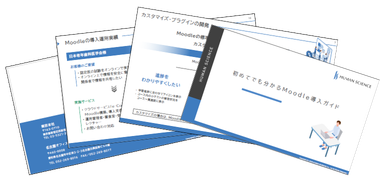
We explain the process of introducing and operating Moodle.
For the introduction and operation of Moodle, please leave it to Human Science, the official partner. We also introduce many achievements in Moodle implementation support.
Projects: Over 866
Companies, Schools, Organizations: Over 80 cases












